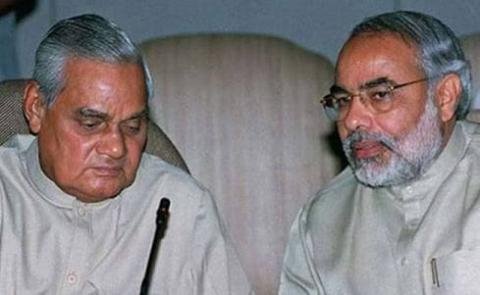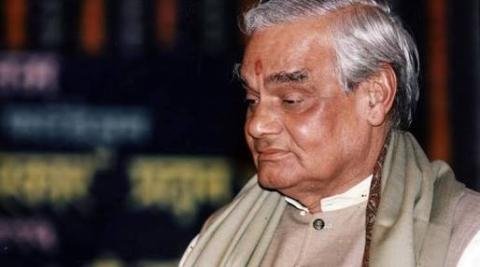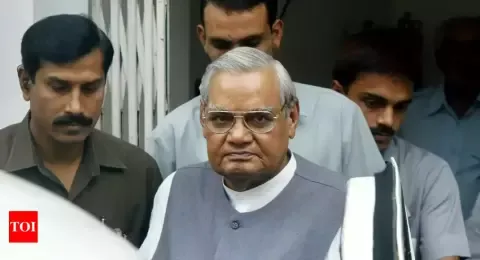
In 1995, the Bharatiya Janata Party (BJP) became strong under the leadership of Atal Bihari Vajpayee and LK Advani. By which BJP emerged as the largest party in the 1996 Lok Sabha elections. The then President Shankar Dayal Sharma had invited Vajpayee to form the government. Vajpayee became India's 10th Prime Minister But they failed to prove a majority in Parliament. His government lasted 13 days. After that, in the 1998 Lok Sabha elections, BJP again became the largest party. The National Democratic Alliance (NDA) was formed and under the leadership of Vajpayee, the government at the Center again became successful and proved very successful in the Parliament but due to withdrawing the support of AIADMK, the government was able to run for only 13 months. It fell on 17 April 1999 by a vote. In spite of this, the popularity of Alhal Bihari Vajpayee was increasing day by day.
Opposition parties failed to form the government after Vajpayee's government collapsed. Then the Lok Sabha was dissolved. In 1999, again the general elections were held. Under the leadership of the BJP, the NDA won 303 seats out of 543 seats in the Lok Sabha. Alat Bihari Vajpayee sworn in as the Prime Minister of India for the third time on October 13, 1999. He drove the coalition government together with 27 parties. Because of Vajpayee, the government was involved in this government which was anti-BJP ideology. Under the leadership of Atal ji, a stable government completed its term and did many such things which became an example in itself. He became the first non-Congress Prime Minister to complete his term.
This could be because they remained immaculate even after having spent nearly six decades in politics. When Atalji led the country, then there was a new political atmosphere in the country. The leaders who were only doing caste, religion and regionalism politics till now also included development in their agenda. It is up to Atal ji that his party and opposition parties today contest elections by making an agenda of good governance and development.

Atal Bihari Vajpayee became the Lok Sabha member for the first time in the Lok Sabha elections of 1957 as a Jansangh candidate from Balrampur Lok Sabha constituency of Uttar Pradesh and remained the leader of the Jana Sangh's parliamentary party till 1977. Vajpayee influenced the art of his speech from Pandit Jawahar Lal Nehru to the country's first Prime Minister. Once upon hearing the speech of Atal Bihari Vajpayee in Parliament, Pandit Jawaharlal Nehru had told them to the Prime Minister of the future, and later the prediction of Pandit Jawaharlal Nehru proved to be true.
The art of making political space, authenticity, aptitude and place among people was amazing. Bharat Ratna and former prime minister Atal Bihari Vajpayee, who devoted entire life to the service of the nation and humanity, had such a personality that he also respected the people of the anti-party. He also gave due respect to the opponents with his heart. In 1971, when India liberated Bangladesh in 1971 war with Pakistan, despite being the Leader of the Opposition, the then prime minister Indira Gandhi, who had surrendered 93,000 soldiers of Pakistan to the knees, was honored by Atal Bihari Vajpayee as Durga in Parliament.
Lok Sabha elections were held in the country in 2004 and the BJP-led NDA contested the elections by giving Shining India slogan under the leadership of Atal Bihari Vajpayee. None of the parties got majority in these elections. With the support of Left parties, Congress formed a government in the center under the leadership of Manmohan Singh and BJP had to sit in opposition. After this, due to constant health decline, he had to retire from politics. Once again in 2014, under the leadership of Narendra Modi, the NDA government was formed and Vajpayee was honored with Bharat Ratna Award.

Let's know the 7 special things associated with him:
Atal1-In the beginning, he joined the student organization. Rashtriya Swayamsevak Sangh's chief activist Narayan Rao Terete impressed with him very much. He served as the Branch Incharge of the Rashtriya Swayamsevak Sangh. He started writing poems in college life. He remained secretary of the College Union in 1943 and became Vice President in 1944.
2-Gwalior graduate and a postgraduate degree from DAV College of Kanpur. After this he went to Lucknow to pursue PhD. But due to joining journalism, he was not getting time to study.
3-Atal Vihari Vajpayee contested for the first time in 1955 but lost in this election. The untimely elections were lost but the courage was not. In 1957, as a candidate of Jan Sangh from Balrampur (Uttar Pradesh), Atal emerged victorious in the Lok Sabha for the first time.
4-From 1957 to 1977, till the establishment of the Janata Party, he remained a leader of the Jana Sangh parliamentary party for twenty years. Even after this his political career continued to touch the heights. Morarji Desai's government was formed, then Atal Bihari Vajpayee took charge of the Foreign Minister from 1977 to 1979. He freed India's image abroad.
5-Atal took over the reins of the country in 1997 as prime minister On 19th April 1998 again, he took the oath of prime minister and under his leadership, coalition government of 13 parties touched many dimensions of progress within the country within five years.
6-Atal Bihari Vajpayee was the first Prime Minister of the National Democratic Alliance government to complete his tenure as Non-Congress Prime Minister. During this time, he was leading a coalition of 24 parties in the NDA, which had 81 ministers. This was the identity of their leadership potential.
7-Atal Bihari Vajpayee is famous as a mass leader but he is also well known in the whole world but his identity is also a well-known poet. He wrote many poems in his life time and from time to time he read from Parliament and other forums. His poem collection 'Meri Ikkawan Kavitayen' is very popular among his supporters.
Sort: Trending